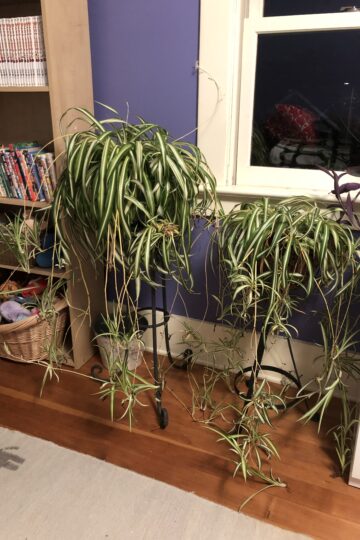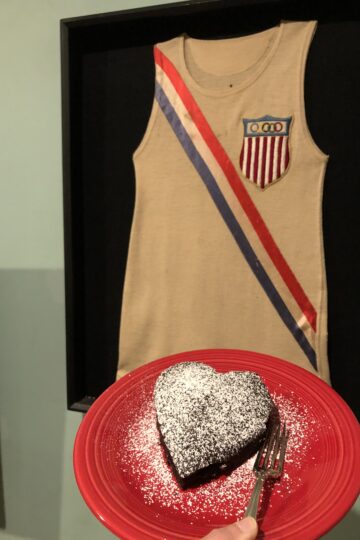July Food Stamp Challenge -- Day Five, Saving Money
Although I set the budget at $101 per person per month for the July Food Stamp Challenge, many people receive much, much less. (A reader just commented about a friend who was getting $16 per month!) In fact, I would be surprised if most food stamp recipients weren't spending out of pocket to pay the difference between their allotment and how much they actually needed to feed their families.
Which is why it's important to save money in every category of your life.
It makes no sense to be scrimping and saving at the grocery store, yet be shelling out the big bucks when it comes to gift giving or pricey vacations. Don't get me wrong, I am all about saving money where it doesn't matter in order to make it available for what does, but if you're having a hard time pulling together money for food, it's time to balance your spending.
I have a number of favorite money saving methods, (really, they're more mindsets than they are methods) that have saved me thousands of dollars through the years, such as:
- Exclusively using my library for my reading needs. I can't remember when I last bought a book, yet I always have something to read. Libraries rock. Period.
- Using my clothesline to dry my laundry and always washing in cold water.
- Keeping my entertainment free or almost free. I am just as happy seeing a second run movie as I am seeing it when it's brand new. $8.75 vs. $2? No contest here.
- Buying gifts at thrift stores. I buy ahead of time, and am rarely left scrambling at the last minute.
- Be both a borrower and a lender. Get to know your neighbors and offer to lend out what you have and ask to borrow in return. Tools, food, equipment, whatever. Create a community of sharing.
- Batch errands. If I have to drive to a certain neighborhood, I make sure to make the most of the trip. Then I'm not having to drive more than necessary. Huge gas and time saver!
- Bring your lunch to work. Always.
- Make a decision that you do not need to own the best of the best. It's okay to not have all your possessions be top of the line. An older TV works just fine and last year's fashions are completely functional.
- Be willing to entertain inexpensively. Your guests are probably happy to go potluck, and no one really cares about what wine you serve.
- Own less. I don't own a lot of clothing, but it's always enough.
- Be willing to make many tiny efforts. I save a nickel when I bring my own reusable bags to the store and I water my plants with the dregs of our water bottles. It all adds up.
- Find inspiration. Read books, talk to people you admire and observe the world around you. Stay away from people who make you feel bad about your lifestyle and financial decisions.
Have anything to add? Please share your thoughts in the comments section below.
Katy Wolk-Stanley
"Use it up, wear it out, make it do or do without"





Your blog is definitely one of the sources where I find inspiration; thank you for continuing to share your tips and thoughts and good humor and positive outlook!
That's so sweet, thank you!
Katy
Living very frugally takes thoughtfulness in all areas, not just food. Most of us could consistently make better choices than we do. That said, for many very poor families a huge problem is housing costs combined with extraordinarily low minimum wages which become the deal-breakers for them. I remember meeting a couple who both worked in the housekeeping department of our local hospital, at little better than minimum wage. And they EACH had another job, so that between the two of them they worked four jobs to support their family! Something is wrong with this picture, and it is not the presumed "laziness" or "complacency" of the poor. I rather suspect this couple already used many, if not all, the tips you provide. Those of us who are more affluent have to think our way through these day-by-day choices.
Katy, I always struggle with how much clothing is enough for my family. I do laundry everyday so we really only need a few basics. But all our family lives far away and we have to take long car rides and we always stay in hotels (family's homes are too small to accommodate our family of 6 and I could never afford flights and a rental car. I don't have access to a washing machine the 2 times we travel each year.) We tend to drive 2 days, visit 5 or 6 then drive home 2 more days. That's a lot of clothes. My husband and I tend to rewear jeans and sweaters a couple times and the older kids do too, but still we have to pack a lot of clothes. I find myself have to buy the younger kids a lot of clothes(deeply discounted the previous season on clearance of course), but still the bureaus and closets are too full for my taste. How much clothing do you really think is enough? I really struggle with this. I'd like to have a minimal working wardrobe for all of us, but family vacations to visit mess this plan up.
We just got back from a 6 day visit to my family. We flew so each of us took one piece of luggage that we could carry on (with the exception of my son who also brought his guitar). My daughter, son and I each packed all of our things in school sized backpacks. My husband brought a bigger backpack but it was not full. Since we were visiting family we knew we could take the bare minimum with us and do laundry at my mom's house if we needed. We ended up not needing to do laundry though.
Since laundry at your relatives is not possible, I'm sure you could find a laundromat. Most of the moderate priced hotels we stay at have one. I am sure you wouldn't want to do laundry every day like you do at home, but maybe you could cut the amount of clothes you needed to take in half.
We are really good about packng for vacation, but unlike you, not as good about getting rid of excess clothes around the house. Something I need to work on.
Here's a frugal travel tip you might find interesting concerning flying with families that saves a little money, a lot of work and aggravation...Each person in my family has a small carry-on with one outfit, undies and night clothes. When we get to our destination, we go to a thriftstore or two (I've researched locations before leaving home) and buy a trip wardrobe of a few items..usually costs less than paying for a couple of suitcases to check, and gets the "shopping bug" out of everybody's system early and inexpensively. Also, since we live in a warm place, if we visit a cold place we buy all coats, warm wear etc. and enjoy them. At the end of the trip, we drop off our purchases at a donation center on the way to the airport, getting a receipt for tax purposes....We've even bought camping gear this way very cheaply and saved lots on motels. This sure beats lugging a heavy suitcase to carryon or waiting in line at baggage carousels.
I love this idea!
Even the lower-end motels usually have laundry facilities available for patrons. My husband has been working away from home most of this year, staying for weeks at a time in motels similar to Super 8, Econolodge, etc. He's always been able to do his laundry right there in the motel. It's definitely something to look into.
Great post - something I'd like to give to all kids as soon as they could understand it, definitely to teens and the college bound and absolutely to the new to the work force and newly married.
I promote libraries everywhere I go, the local thrift store that supports Rape And Abuse Emergencies (where clothes are $1 a piece) and reusing, repurposing & recycling endlessly.
We've been able to raise 3 boys on an income of less than $35,000, retire on $1500 a month, and weather a series of bad financial situations in the last 7 years (started with Hurricane Charlie). Could not have done this without following the advice you've given PLUS the mind set of frugality.
Along with using libraries, here's another tip. I love to browse Barnes and Noble...check out the latest arrivals or other books I want to read...write down those titles in a notebook while I am there, then put them on reserve at the library when I get home. A brand new book for me at no cost!
Living large on little can be done.
Jinger,
I do the same thing but with book reviews from the newspaper, etc. If I go into a book store I am far too tempted to buy something 😎
I do love getting notification from the library that a book, or movie, I have been waiting for has come in. It is almost like getting a present.
I was just mentioning this same thing yesterday to a friend. I put books on reserve at the libaray whenever I hear about a good one -- book review, from a friend, wherever. Then, at some point in the future (maybe even over a year later), I get an email telling me the book is waiting for me at the library. It's like getting a present! 🙂
I do the same thing, but with browsing on amazon.com. I see books I'd like to read, and instead of ordering them, I pop on over to my library's website and request them. I get an email when they're ready for me to pick up at my branch. Sometimes it's one day later, sometimes it's months later, depending on the popularity of the book. But it always feels like a free gift!
Agree, Lisa...it's like Christmas when I come home from the library with 4 or 5 brand new books!
Funny! I do this at Powell's bookstore, and I used to do it at Hollywood Video before they closed down.
Katy
i do the exact same thing!!! it makes me feel like i'm shopping without actually spending any money. my husband makes fun of me sometimes because of how many books i have on reserve but i always counter with "do you know how much money i'm saving us"?
Where do they live that they only get $16 per person per month? I honestly don't believe that is even worth getting because no one can live off that. It doesn't make sense, unless they're on the very cusp of the poverty line, and if they make even $1,000 more they'd be off food stamps. But in my limited (working at a super walmart in a poor area) experience most people get more than that (though still not enough).
You always inspire me to spend less money! And, on a related note, we're going camping this weekend (cheap get-away...$16 a night!) and having neighbors watch our kitties. Last time Geoff insisted on getting them a gift card ($25 to IHOP because they have kids) but this time I'm going to bring them a couple loaves of homemade bread as a thanks instead 🙂
Usually (in my area) individuals that recieve less than $50.00 a month are on SSI or SS.
I don't know about other places, but here (MO) when my adult daughter was on SNAP, her amount was based on her income. The maximum benefit was for someone with no income. Lesser amounts were for people who did have some money coming in. So a $16 amount might have just been a stop-gap amount for someone who was earning money but still needed help.
I find your comment about not owning a lot of clothing to be interesting. I'm currently pregnant and wearing maternity. I have a nice maternity wardrobe, but it's small, as I couldn't see spending money on more than the minimum. It's weird to me to have so few choices, yet it's kind of freeing. Seeing as I need to do a ton of reorganization around the house to accomodate all the baby stuff coming in, I'm thinking I'll be culling a lot of my regular wardrobe. It's just hard to break the habit of having tons of clothes and choices.
Interestingly, I assumed that I'd have to wear the same couple of things to church week after week. Instead, I'm finding that I'm able to mix-and-match stuff enough that I'm still able to dress nicely for church without repeating my outfits over and over. Having less doesn't necessarily mean not having enough to still make things interesting.
Anne Marie, I say go for it, with culling your regular wardrobe too. I did this last winter to my entire wardrobe while I was in the midst of a decluttering frenzy, and I can't tell you how freeing it is. And I think I actually dress nicer than before. There's something about only having my most well-liked clothes to choose from that feels great. Also, congratulations on the pregnancy!
I live in a 2 wardrobe area (my house is in the 80s in the summer and the 60s in the winter) so I switch my clothes around in the spring and fall.
When I did the swap just over a month ago (late spring, this year) I tried to limit my wardrobe to 30 pieces which still sounds like a lot but it was a first step. I didn't succeed but I did keep it under 50 and now, 6 weeks into the experiment find there are about 10 items I haven't even contemplated wearing yet so obviously, I can go even lower and not notice.
I swapped one skirt for another, put away one dress that doesn't fit (but I like it enough to try again next year) and put one t-shirt that is too tight in the giveaway bin today.
As you said, it is freeing to have less to choose from. And it is also easier to find things because my closet isn't packed tight.
I'll be trying this again in the fall and by next year I'll have to think hard about actually getting rid of the excess clothes. I'm not influenced by what is 'in', preferring my clothes to be 'timeless' and 'me' so they don't go out of style. I also have tons of storage room now, so I'll keep the excess items and 'shop' from the basement hen I want something new, swapping out with something from my closet, rather than going shopping.
I agree completely that being frugal is a mindset. It bugs me to no end when people say that doing (for example) recycling won't make any difference. I explain it's not just that one thing, but the entire way I live my life. There are, I believe, enough people doing all these things that it helps our planet, as well as our individual lives.
Katy, you and Frugal Girl, Angela Barton, Naomi Selden, and others are really being a good influence on me! I have always done a lot of frugal/green things, but now I hang my laundry, use vinegar in place of fabric softener as well as in cleaning solutions, and yesterday baked homemade-from-scratch-with-fresh-organic-blueberries muffins. I'm even thinking about baking my own bread and actually cooking meals from scratch and freezing "TV dinners".
In case anyone missed this news flash, until around Labor Day you can save 10 cents a gallon on gas by getting a Walmart gas card or gift card and filling up at the Murphy gas stations. That's where I'm going right now!
Since July is a long month, and we had an unexpected invite out over the weekend, I'm going to try one of my favorite food budget stretchers this week--waiting to do my weekly shopping until 10 days have passed. It's a good way to clean a couple of things out of the freezer and/or pantry and catch up with the garden produce in the summer. And it's probably what a lot of food stamp recipients do at the end of EVERY month.
As for wardrobe: If you have friends with the time to notice that you wear the same thing to church every week, or the rudeness to remark on it, it's time for new friends! Thank goodness I live in the West where casual is the norm as it saves on a lot of clothing purchases. We do live in a climate that requires a lot of footwear, however. Sometimes I dream of living in Hawaii where I could own only a pair of sandals, a pair of flip-flops and a pair of tennis shoes.
My biggest saving tip is to: stay healthy. Nothing is more expensive than an illness. I do this by eating right, eating organic, and staying active. Since I started my journey to better health 2 years ago, I have not been seriously ill (as in missing work and not being able to function). This insures that I don't pay a dime in unnecessary doctors visits and expensive medications. An ounce of prevention is indeed worth a pound of cure. I don't think people often think about how important their health is in not only their happiness (the most important thing in my view), but also in their savings strategy.
Not owning a TV or a car, and not eating meat. I make my own body oils, moisturizers, cleansers, scrubs, and perfumes. I recently learned to make soap so I don't buy that anymore either. I only take the bus one way, when I come home I always walk. I didn't do any of these things to save money. Saving just happens to be a benefit of these lifestyle choices. If saving money were my only intention I'm sure I would have failed miserably at all of it!
I love reading this blog.
I love your ideas. I'm extremely frugal, originally because I had to be, but now it's a challenge. I love to shop thrift stores, make ALL our food from scratch (including raising all our own food: dairy, meat and produce), I sew and mend our clothing, I use vinegar as a fabric softener and make my own soaps. We homeschool, and rather than purchase expensive curriculum, I create my own, using library books & videos and free resources off the net. I found school desks on freecycle. I stock up on school supplies when they're on sale. Rather than use paper towels, I cut up old towels and use the rags. We live off-grid, so we conserve energy like mad, our clothesline is my best friend!
One area that I would mention is raising children frugally. Others have touched on the issue of clothing our kids inexpensively, but I would like to mention the topic of activities for our children.
I live in a highly educated, pretty wealthy suburb of a major city, and find that the attitude of many parents I meet is that children must be in multiple club sports, play instruments, speak other languages, and have tutoring to be well-rounded. The amount of money (and time) spent in taking elementary-school aged children to and from expensive "enrichment" lessons is astounding. In our neighborhood, hardly any children play outside or hang out after school, because their parents whisk them off to extra-curricular activities.
We have chosen the (counter-cultural) frugal alternatives not just because we have more modest means than some, but deliberately, because we don't believe that all the programmed, over-scheduled activity is good for children's development. I think my kids are just as happy after school playing outside at the playground or exploring the backyard, going to the library, reading, playing board games, eating dinner with their parents, and sometimes just being a little "bored" and having to figure out how to occupy themselves.
We are currently raising our granddaughter (8yo) the same way. If she shows a true and sustained interest in an activity, then she can participate in one activity at a time. (My one exception is that I insisted on swim lessons...for safety's sake.)
Limiting activities DOES save money, but as you pointed out, it also allows the kiddos to have some unstructured (stress-free) time to learn to occupy themselves and solve problems on their own.
If I know in advance I'm not going to finish my whole plate of food, I'll eat to have the right proportion of leftovers, or finish eating what won't keep well, and save what does.